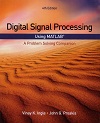

 |
 |
 |
 |
|||||||||||||||||||||||||||||||||||||||||||||||||||||||||||||||||||||||||||||||||||||||||||||||
 |
||||||||||||||||||||||||||||||||||||||||||||||||||||||||||||||||||||||||||||||||||||||||||||||||||
 |
Digital Signal Processing Using MATLAB:A Problem Solving Companion 4/e+作者:
Ingle+年份:
2017 年4 版
+ISBN:
9781305635128
+書號:
EE0449PT
+規格:
平裝/單色
+頁數:
654
+出版商:
Cengage
+參考資訊:
|
定價
$ |


|
本站購物功能已關閉,點選"購物車"圖示會自動連結到新的購書網頁!或與LINE客服諮詢聯繫
讀者購書請至★滄海書局‧鼎隆圖書購書網 ★https://eshop.tsanghai.com.tw/★
滄海ESHOP購書網提供更方便、快速訂購、結帳付款的購書服務,並提供數位產品購買專區~
書籍若有教學輔助配件,僅提供採用老師教學使用,是非賣品,不販售,亦無法提供一般讀者。
本書附有 網路章節,請讀者至本書「一般檔案下載」處自行下載。
●THIS EDITION INTEGRATES THE MOST CURRENT VERSION OF MATLAB®. Your students learn to master this useful program and maximize the latest features and capabilities of MATLAB®, including enhancements for handling large data, new hardware support and integrated documentation
●DISCUSSION OF LATTICE/LADDER FILTER IS NOW PRESENTED LATER IN THE BOOK. This edition’s coverage of lattice/ladder filters has moved from Chapter 6 to Chapter 14 -- the online chapter on Linear Prediction and Optimum Filters -- for a more logical presentation of information.
●NEW CONCISE ON-LINE CHAPTER DISCUSSES RANDOM VARIABLES AND RANDOM PROCESSES. You now have the flexibility to introduce random variable and random processes, including bandpass processes, in this timely online chapter. The authors make these topics easier to understand with extensive MATLAB® examples.
●NEW ON-LINE CHAPTER EXAMINES LINEAR PREDICTION AND OPTIMAL FILTERS. You can further prepare students for graduate studies with close examination of linear prediction and optimal filters, as well as coverage of lattice filters.
●NEW ON-LINE CHAPTER STUDIES ADAPTIVE FILTERS. This flexible, online chapter contains easy-to-understand LMS and RLS algorithms with an extensive set of practical applications, including system identification, echo and noise cancellation, and adaptive arrays. All algorithms and applications are explained and analyzed using MATLAB®.
●MASTERY OF MATLAB® ENABLES STUDENTS TO EXPLORE MORE COMPLEX DSP PROBLEMS. This book clearly presents the concepts and emphasizes the applications of MATLAB® to make it possible for your students to study more complex DSP problems than are normally taught in undergraduate-level courses.
●COVERAGE HIGHLIGHTS MATLAB® FUNCTIONS AND SCRIPTS WITH INSIGHTS INTO KEY PROCEDURES. Thorough presentation enables your students to modify problem values and parameters and study scripts that offer meaningful insights into MATLAB® procedures.
●BOOK ADDRESSES BOTH BASIC AND ADVANCED TOPICS. Extensive integration of MATLAB® features and capabilities introduces basic and advanced topics, making this a valuable resource for new students or those already familiar with MATLAB® functions.
●DETAILED COVERAGE EXPLORES ANALYSIS AND DESIGN OF FILTERS. The authors address important topics in great detail, including the analysis and design of filters and spectrum analyzers.
●BOOK SERVES AS IDEAL SUPPLMENT TO YOUR DSP TEXT. This book is an excellent MATLAB® supplement with flexible coverage that works well to support virtually any traditional DSP text you prefer for your course.
●AUTHORS INTRODUCE KEY TOPICS EARLIER FOR INITIAL MASTERY. Your students are introduced to fundamental functions, such as Number Representation, Process of Quantization, and Error Characterization, early in the book for initial success.
●BOOK SIMPLIFIES DISCUSSION ON THE PARKS‐MCCLELLAN ALGORITHM. The authors use their experience to clearly present the Parks-McClellan algorithm to enable easier understanding of this complex topic.
●COVERAGE PROVIDES SIMPLIFIED, CONCISE DISCUSSION OF RANDOM VARIABLES AND RANDOM PROCESSES. Students study random variables and random processes, including bandpass processes, in a clear presentation that is suitable for undergraduate as well as graduate students.
●NEW GRADUATE-LEVEL MATERIAL PREPARES STUDENTS FOR SUCCESS IN ADVANCED STUDIES. The authors provide clear introductions to more complex topics, such as linear prediction, optimal filters and adaptive filters with applications to communications systems, system identification, LPC coding of speech, and adaptive arrays.
●MASTERY OF MATLAB® ENABLES YOU TO EXPLORE MORE COMPLEX DSP PROBLEMS. This book clearly presents key concepts and shows you how to apply MATLAB® so you can study more complex DSP problems than are normally taught at the undergraduate level.
●COVERAGE HIGHLIGHTS MATLAB® FUNCTIONS AND SCRIPTS WITH INSIGHTS INTO KEY PROCEDURES. Thorough presentation enables you to modify problem values and parameters and study scripts that offer meaningful insights into MATLAB® procedures.
●BOOK ADDRESSES BOTH BASIC AND ADVANCED TOPICS. Extensive integration of MATLAB® features and capabilities introduces basic and advanced topics, making this a valuable resource, whether you are new to MATLAB® or already familiar with the essentials.
●BOOK SERVES AS AN IDEAL COMPANION FOR YOUR DSP TEXT. This book complements your DSP text as an excellent MATLAB® supplement with flexible coverage.
●DETAILED COVERAGE EXPLORES ANALYSIS AND DESIGN OF FILTERS. The authors address important topics in great detail, including the analysis and design of filters and spectrum analyzers.
Dr. Vinay K. Ingle is an Associate Professor of Electrical and Computer Engineering at Northeastern University. He received his Ph.D. in electrical and computer engineering from Rensselaer Polytechnic Institute in 1981. He has broad research experience and has taught courses on topics including signal and image processing, stochastic processes, and estimation theory. Dr. Ingle has co-authored numerous higher level books including DSP LABORATORY USING THE ADSP-2181 MICROPROCESSOR (Prentice Hall, 1991), DISCRETE SYSTEMS LABORATORY (Brooks-Cole, 2000), STATISTICAL AND ADAPTIVE SIGNAL PROCESSING (Artech House, 2005), and APPLIED DIGITAL SIGNAL PROCESSING (Cambridge University Press, 2011).
Affiliation: University of California, San Diego and Northeastern University
Bio: Dr. John Proakis is an Adjunct Professor at the University of California at San Diego and a Professor Emeritus at Northeastern University. He was a faculty member at Northeastern University from 1969 through 1998 and held several academic positions including Professor of Electrical Engineering, Associate Dean of the College of Engineering and Director of the Graduate School of Engineering, and Chairman of the Department of Electrical and Computer Engineering. His professional experience and interests focus in areas of digital communications and digital signal processing. He is co-author of several successful books, including DIGITAL COMMUNICATIONS, 5E (2008), INTRODUCTION TO DIGITAL SIGNAL PROCESSING, 4E (2007); DIGITAL SIGNAL PROCESSING LABORATORY (1991); ADVANCED DIGITAL SIGNAL PROCESSING (1992); DIGITAL PROCESSING OF SPEECH SIGNALS (2000); COMMUNICATION SYSTEMS ENGINEERING, 2E (2002); DIGITAL SIGNAL PROCESSING USING MATLAB V.4, 3E (2010); CONTEMPORARY COMMUNICATION SYSTEMS USING MATLAB, 2E (2004); ALGORITHMS FOR STATISTICAL SIGNAL PROCESSING (2002); FUNDAMENTALS OF COMMUNICATION SYSTEMS (2005).
1. INTRODUCTION.
2. DISCRETE-TIME SIGNALS AND SYSTEMS.
3. THE DISCRETE-TIME FOURIER ANALYSIS.
4. THE z-TRANSFORM.
5. THE DISCRETE FOURIER TRANSFORM.
6. IMPLEMENTATION OF DISCRETE-TIME FILTERS.
7. FIR FILTER DESIGN.
8. IIR FILTER DESIGN.
9. SAMPLING RATE CONVERSION.
10. ROUND-OFF EFFECTS IN DIGITAL FILTERS.
11. APPLICATIONS IN ADAPTIVE FILTERING.
12. APPLICATIONS IN COMMUNICATIONS.
*13. RANDOM PROCESSES.
*14. LINEAR PREDICTION AND OPTIMUM LINEAR FILTERS.
*15. ADAPTIVE FILTERS.
*Chapter 13-15 are online chapters.



























